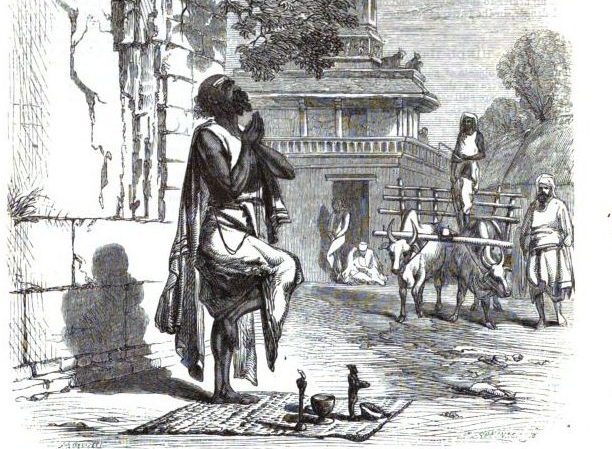Throughout the generations, storytelling has been one of the most effective and compelling ways to teach children good habits and moral concepts. This rings true especially in India, where traditional tales have been passed down for thousands of years to impart and preserve values for younger generations. In this series, we retell some of these traditional Indian folktales to revive simple yet profound moral lessons that can enrich our lives today.
Continued from: Indian Folktales With Moral Lessons – Part I: Greed Causes Greater Loss Than Gain
Today’s selection of Indian folktales demonstrate how it is better to be a good person than to protect our pride and reputation. The first fable is taken from the well-known collection of Jataka Tales – a compilation of stories that illustrate the virtues of Gautama Buddha in his previous lives. The second story comes from the Panchatantra, an ancient Indian collection of animal fables.
The Wind and the Moon
Once upon a time, there were two cubs whose friendship was strong as steel. Though one of them was a lion and the other a tiger, their bond superseded the differences between them.
They lived under a mountain where the atmosphere was peaceful and tranquil, not only because of the harmony inherent in nature, but also because of the presence of a monk who lived in seclusion nearby.
Success
You are now signed up for our newsletter
Success
Check your email to complete sign up
One day, the two friends got into an argument. The tiger asserted that the cold wind came when the moon waned from full to new, while the lion, fixed on his views, declared that the cold wind appeared when the moon waxed from new to full.
Young and impetuous, the two friends started hurling insults at one another without considering the lasting effects that mindless words can cause. It seemed that the many years of friendship they shared could be shattered in an instant.

To settle the argument, the two friends decided to consult the wise monk. After bowing to him, the lion and the tiger proceeded to describe the problem, asking the monk which of the two was more intelligent. Much to their surprise, the monk said that they were both right.
“It can get cold in any phase of the moon, so you’re both right. What is not right is that you have risked your friendship for ego and reputation. Let me remind you that being right is not what is important. What is important is that you are able to respect each other and recognize your own shortcomings.”
The monk then gave another piece of advice, “When there is a conflict, you should not think of separation, but of solutions. You must remain united because unity makes you stronger.”
The two friends understood the sage’s words and apologized to each other. They returned home, but not before promising to put aside their ego and cultivate humility.
The Girl Who Married a Snake
As the story goes, there was once a Brahmin – a man who belonged to the caste of spiritual masters in Hindu society – whose wife was unable to conceive. Their prayers to God asked not for material gain but carried only one wish: the blessing of a child.

Their sincere prayers received an answer from above. The Brahmin’s wife soon gave birth to a baby who resembled neither his mother nor his father, for he was a snake.
This strange surprise did not deter the wife from loving her non-human son. Although villagers fervently advised the couple to get rid of the snake, she devotedly cared for him and raised him to become a good and healthy snake.
Many years later, after learning of the marriage of two young adults in the village, the mother realized that her son had also reached marrying age. Would any woman be willing to marry a snake? The mother had faith that they could find one.
However, finding such a girl proved to be very difficult. Hopeless, the mother broke into tears, thinking that her son would be alone forever. When the Brahmin saw his wife in despair, he resolved to find a bride for his son, no matter how far he had to go.
The determined father traveled to several cities with no success. Finally, he remembered that a good friend of his lived in the city he was passing through, and decided to pay him a visit.
His friend was overjoyed to see him after so many years and asked about the reason for his travels. The weary father shared that he was looking for a bride for his son. Right away, the man offered his daughter’s hand in marriage, confident that his friend’s son would make a good husband.
Despite the Brahmin’s suggestion that his friend meet his son before giving his daughter in marriage, the friend insisted on sending her home with him. When the faithful mother heard the good news, she began to make preparations for the celebration.
Villagers started to interfere, telling the bride that marrying the snake would bring nothing but disgrace. The virtuous lady, determined to uphold her father’s word, disregarded their remarks and married the good-hearted snake.

As a wife, she was very attentive and considerate. She made the daily meals and ensured that their home was always warm and clean. Although it was not your average marriage, she unconditionally embraced the will of Heaven.
One night, ready to go to bed, the wife found a young man standing in her room. Before the terrified lady could scream for help, the handsome stranger gently told her, “Don’t you recognize me? I am your husband, in human form. I have come out of the snakeskin.”
But the faithful wife did not believe him, and even less did she want to be alone with a man who was not her husband. Moved by his wife’s loyalty, he transformed into the snake and then became human again. The wife fell at his feet as tears of joy rolled down her cheeks.
But their joy was not complete, for he could only take human form when the sun was not in the sky. For several nights, the man and wife spent time together until the break of day, time and again, heralded his transformation.
One night, the Brahmin heard voices coming from his daughter-in-law’s room. Suspicious at first, he caught a glimpse of his son’s surreal transformation. Overcome by his long-held yearning for a human child, the father burst into their room and threw into the fire the lifeless snakeskin that had long kept his son trapped.
Touched by his father’s heroic act, the son explained that he had been under a curse and that the only way to break it was for his snake body to be destroyed without his consent.
His wife, who had kept her promise despite the judgment of others and had cared for him wholeheartedly without thinking of herself, was rewarded for her devotion and loyalty. They lived together happily ever after.
Both the friends in the first story and the wife in the last understood the importance of being virtuous over validating themselves. The practical application of such a simple principle can turn difficult situations into valuable opportunities for growth.














